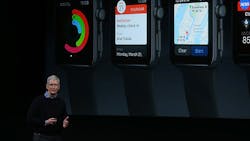Smartphone shipments might be sputtering in the U.S., Europe and other mature markets, but in India, there’s the prospect of a billion new device sales. It’s probably no surprise then that Apple Inc. CEO Tim Cook is making his first trip to the country.
Cook, who begins his multiday visit on Wednesday, will unveil a development center for digital maps in Hyderabad and introduce an accelerator program for iOS developers in Bangalore, a person with knowledge of the trip said. Apple is pushing to open its first retail stores in the country, though it’s not clear whether any discussions will be part of the CEO’s agenda on this trip.
The prize is more than 1 billion smartphone sales in the next five years, according to researcher Counterpoint. As China’s market becomes more saturated and people across the globe upgrade their smartphones less frequently, Apple, Samsung Electronics Co. and other vendors are keen to sell to India’s middle class, which is projected to quadruple to 200 million by 2020. Signs of this explosive rise in consumption already emerged in the first three months of this year, when Apple reported that shipments in India grew 56%, even as iPhone sales declined globally for the first time ever.
“I’m encouraged by the results that we’re beginning to see there, and believe there’s a lot, lot more,” Cook said on Apple’s latest earnings call. “I view India as where China was maybe seven to 10 years ago from that point of view, and I think there’s a really great opportunity there.”
Apple didn’t immediately respond to a request for comment on the mapping center and accelerator.
Cook’s visit is underscored by the challenges that Apple already faces in India. Apart from the application to open Apple Stores, the company is also facing stiff opposition to its efforts to import and sell refurbished iPhones in the country. Apple isn’t even among the top 10 in terms of smartphone market share, according to Bloomberg Intelligence analyst Simon Chan. Samsung boasts the biggest share, followed by Micromax Informatics Ltd., Lenovo Group Ltd. (including Motorola) and Intex Technologies (India) Ltd.
“Mr. Cook is certainly going to come with an agenda,” said Vishal Tripathi, a research director at Gartner India. “High on that list is permission to open Apple Stores in India, bring up the closed chapter of importing and selling refurbished phones in the country and also explore what’s in it for Apple if it brings assembly and manufacturing to the country.”
The CEO is planning to meet Prime Minister Narendra Modi, although that schedule hasn’t been finalized because the results of several Indian state assembly elections are due this week, said the person, who asked not to be identified as the information is not yet public.
“There is a massive opportunity for every player in the mobile value chain when the second largest market by volume is still under penetrated and growing, while the rest of the world smartphone demand has waned,” Peter Richardson, Counterpoint’s research director, wrote in the report. “India is the next China.”
Apple has a network of 33 stores in China, which made up a quarter of the company’s revenue in the latest quarter. Cook’s trip to India comes on the heels of a deal struck in China this month, where Apple is investing $1 billion in car-hailing app Didi.
One key hurdle facing Apple in India is price, according to BI’s Chan. India’s consumers aren’t willing to pay as much for the gadgets in a market where phones are typically bought outright and aren’t available on calling plans. While Apple’s most affordable smartphone, the iPhone SE, starts at $399, the average selling price for a phone in India is projected to decline to $102 by 2018 from $135 in 2014, according to IDC, less than half the global average.
IDC’s smartphone sales figures from the latest quarter also underline how nascent India’s market remains, and how much more it has to go to reach the lofty projection for 1 billion in shipments in five years. Vendors sold 23.5 million phones in India in the period, a rise of 5.2% from a year earlier.
“The catch in India is that the customers are very price sensitive,” Chan said. “If you think China is cheap or low end, then India will be even lower.”
By Saritha Rai
About the Author
Bloomberg
Licensed content from Bloomberg, copyright 2016.
